East Timor in Transition
After the Election, Part I of II
The kettle started whistling. It was 9AM on the dot and the first pitch of Game 1 of the World Series was about to be delivered. I poured out a healthy dose of Chivas Regal into a clear glass.
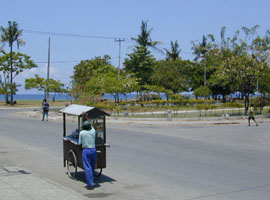 After securing the bottle in my desk drawer, I went to the newsroom kitchen. When I returned with the kettle, I noticed a dense fog hovering inside; junior reporter Junko was standing at the edge of my desk, tapping her right foot. She wanted to know about my recent trip to East Timor, no doubt.
After securing the bottle in my desk drawer, I went to the newsroom kitchen. When I returned with the kettle, I noticed a dense fog hovering inside; junior reporter Junko was standing at the edge of my desk, tapping her right foot. She wanted to know about my recent trip to East Timor, no doubt.
"Can't whatever it is wait until after the ballgame?" I asked, not allowing her to start in with her usual demands. "We've got Mussina matched against Schilling." I pointed at the radio as I took my seat.
I added a small amount of water from the kettle to my glass. Never begin work on an empty stomach, I always say.
"A little hair of the dog that bit you last night?" she asked, pretending to not know that there is only one answer to that question.
"Just taking the bite off my morning's apple juice, my dear." I took a deep sip and smacked my lips.
"I was supposed to have your report on East Timor to the Boss yesterday," she said, folding her arms and leaning over my desk. "Where is it?" She punctuated her question with a final hard tap of her foot.
I reached back and grabbed a folder from the top of my file cabinet. With the first pitch of the game to Knoblauch from Mussina taken high for a ball, I handed it to her. She turned back the brown cover and started reading. Knoblauch popped out to second.
It is just a bit after 4PM and many young and middle-aged men approach the compound. They are dressed in typical South Pacific wear (t-shirts and shorts) and are all carrying cocks. Inside, a dozen of the birds - white, crimson, and black - pace back and forth on the gravel-covered hardpan just outside the compound's pit. Each has a single length of white string attached to one of its legs with the other end tied to a pole or firmly in the grasp of the bird's owner. Prospective gamblers kick at the gravel with their sandals or sit on wheel rims under the eaves of the makeshift buildings to gain shelter from the light rain. Most smoke the Indonesian cigarettes that are readily available in packs or singles from the lone vendor whose table sits at the center. Other vendors are outside peddling drinks, snacks, and fruit from their carts. A few owners hold their cocks in their arms and dutifully pat their feathers, hoping to bring them luck in the series of cockfights that are almost ready to begin.
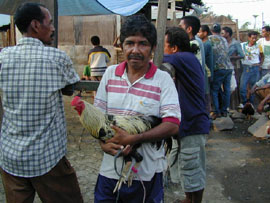 The
compound is called bairro pite and is centrally located
in Dili, East
Timor. The pit is the main component and is a very simple
set-up: a chicken wire and wood post fence forms a rectangle
outlining the pit, discarded aluminum siding on a pair of
hinges is the entrance gate, a small green tarp (with United
Nations High Commission for Refugees markings) hangs overtop
for shelter from sun and rain, and slats of wood nailed to
short posts provide benches for onlookers immediately outside.
The popularity of the bouts though would later render the
latter to be woefully inadequate as a crowd three rows deep
would encircle the pit once the fighting begins.
The
compound is called bairro pite and is centrally located
in Dili, East
Timor. The pit is the main component and is a very simple
set-up: a chicken wire and wood post fence forms a rectangle
outlining the pit, discarded aluminum siding on a pair of
hinges is the entrance gate, a small green tarp (with United
Nations High Commission for Refugees markings) hangs overtop
for shelter from sun and rain, and slats of wood nailed to
short posts provide benches for onlookers immediately outside.
The popularity of the bouts though would later render the
latter to be woefully inadequate as a crowd three rows deep
would encircle the pit once the fighting begins.
The proprietor and organizer of the festivities is Igidio. Wearing a t-shirt that reads: The Changing Face of Gambling, the round, stout, and very dark skinned man of perhaps 40 enters the pit. A primary school kid named Nerry mans the aluminum gate. Others in Igidio's employ roam the grounds taking bets from the all male East Timorese crowd. The female and foreign presence does not exist.
Outside the pit, fists of cash emerge from pockets as the 3-inch gaff is attached to the first match's combatants. During this ceremony, gamblers look for signs of aggression in the cock's demeanor. As a red string is wrapped around the back of the crimson cock's left heel to hold the razor sharp gaff in place, money (Indonesian ringit and US$) begins to rapidly change hands. His opponent for this match is a white bird and a crowd has gathered around his gaff application procedure as well. Since the matches last not more than a few minutes, each owner takes great care in making sure the angle of the gaff is appropriate. A small miscalculation could lead to an early exit for his bird.
After the gaff is attached, the owners then attempt to create a fighting spirit within their bird by gripping them from the back and thrusting them at their opponent in rhythmic motions. The birds flap and squawk but can only get within a half-foot of one another. Gamblers watch carefully to get a sense of which bird may be the strongest or most aggressive.
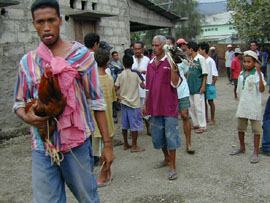 Then with their birds clutched in their arms like babies, the owners enter the pit through the gate. The gamblers take a space outside. It is standing room only. Cigarettes dangle from between lips and cash is clenched in nearly all hands that occupy the three rows. The fight is to death or until one of the owners concedes defeat. The bout starts in a fashion similar to the sparring that took place outside the pit with the opposing owners again going through the feigned lunging routine. Then after three thrusts forward at one another, the owners release the birds and they fly into a frenzied mix of feathers and dust.
Then with their birds clutched in their arms like babies, the owners enter the pit through the gate. The gamblers take a space outside. It is standing room only. Cigarettes dangle from between lips and cash is clenched in nearly all hands that occupy the three rows. The fight is to death or until one of the owners concedes defeat. The bout starts in a fashion similar to the sparring that took place outside the pit with the opposing owners again going through the feigned lunging routine. Then after three thrusts forward at one another, the owners release the birds and they fly into a frenzied mix of feathers and dust.
In East Timor, the cockfight, which has been around since ancient times, is seen as a rite of passage to adulthood or as a means of displaying strength among fellow villagers.
East Timor is now itself in transition. Though unlike the nature of cockfighting, it is hoping to leave any violent elements behind. The region is now in transition from the brutal Indonesian regime that ruled for 24 years. On August 30, 1999, East Timorese voted in favor of independence. The announcement of the result (80% in favor of independence) was met with murder, looting, and arson at the hands of militias that were oftentimes supported by the Indonesian Government. Thousands of East Timorese were killed and approximately 500,000 were displaced from their homes.
In the time since, the United Nations has slowly tried to give the people of East Timor the infrastructure and training needed for them to exist as a free democratic country. This August 30th, another election was held. This time to determine an 88-member constituent assembly that will be responsible for drawing up a constitution. This will then lead to a presidential election and full independence, hopefully next year.
This transition though will take time and aside from a few foreign-owned restaurants, offices, and hotels catering to foreign workers, not many structures in Dili have been reconstructed since the recent eruption of violence. Under the guidance of the United Nations, a stable water supply and electrical system is in the making and transportation on land and sea is being reestablished. Though full implementation is years away.
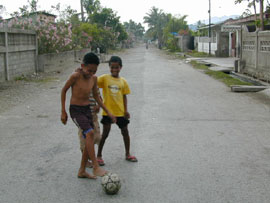 Still, visible strides at creating a fully functioning city are being made. Police boxes now sit on many major street corners in Dili. During rush hours, the two officers that occupy the boxes direct traffic. While they are providing a service, more importantly they represent the peace and stability that the East Timorese people want, or so says Sergio Viera de Mello of the United Nations Civilian Police. He says to the East Timor Sun, "They have acquired one fundamental right which [is] the right to live in peace and that is the right we will defend as long as we are here."
Still, visible strides at creating a fully functioning city are being made. Police boxes now sit on many major street corners in Dili. During rush hours, the two officers that occupy the boxes direct traffic. While they are providing a service, more importantly they represent the peace and stability that the East Timorese people want, or so says Sergio Viera de Mello of the United Nations Civilian Police. He says to the East Timor Sun, "They have acquired one fundamental right which [is] the right to live in peace and that is the right we will defend as long as we are here."
Quality employment for East Timorese people is another positive sign. Australia, New Zealand, Japan, Portugal, and others have flooded Dili as members of the United Nations, government agencies, and various NGOs. "I have friends that work as drivers for the Japanese Government or NGOs," says Dulcy, 18, a waitress at the Dili 2000 Hotel. "Others work for the UN and travel companies. But the first thing is they have to know English."
With the foreign presence relatively high now, English knowledge is the key to getting a decent job in East Timor. A driver can earn approximately US$150 a month if he can speak English. Maybe that is not much, but Dulcy says that it is certainly more than could be derived from selling snacks, vegetables, and meat from a cart or gasoline from the roadside.
But as UN tasks are completed in East Timor and government duties are handed over to local officials, foreign aid workers will begin to leave. In fact, this has already started and in many cases a falloff in business can already be seen.
At the Dili 2000 Hotel, serving solely foreign aid and private company workers, a reservation in advance is not needed now. Whereas a few months before it was absolutely necessary. Room prices too have steadily dropped, from nearly US$100 a year ago to around $70 now.
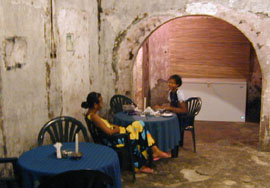 The proprietor of Dynasty, a restaurant specializing in Chinese steamboat cuisine, used to lament the fact that he could not get Singaporean-style vegetables for his dishes. Now his concerns are the fall in his business over the past few months and the glum prospects for the future. "Two thousand UN staff will leave from the first of next year," he says. Other restaurants have closed completely and so have general merchandise shops over the last 6 months as a result of the UN departure.
The proprietor of Dynasty, a restaurant specializing in Chinese steamboat cuisine, used to lament the fact that he could not get Singaporean-style vegetables for his dishes. Now his concerns are the fall in his business over the past few months and the glum prospects for the future. "Two thousand UN staff will leave from the first of next year," he says. Other restaurants have closed completely and so have general merchandise shops over the last 6 months as a result of the UN departure.
Looking at things from a little different perspective is the East Timorese owned Uma Mutuk, or "burnt house." This restaurant specializes in beef and fish dishes cooked in the local style. True to its name, it was burned during the violence two years ago. Since then it has been cleaned out and tables set down. There are no windows or doors. Only stripped concrete walls, columns, and a few lighting fixtures exist. Typically, there are only one or two items on the menu and it changes daily depending on what beef and fish is available. Other than on weekends, there are not many customers. But the mere existence of an East Timorese business with a sense of humor might be more important at this point.
Coming next week: East Timor Remembers and Looks Ahead

